Are you considering pursuing a Masters degree in the UK? With its prestigious institutions, diverse student population, and strong academic reputation, the UK is a top destination for international students seeking higher education opportunities. But with so many universities to choose from, how do you determine which ones are the best for Masters programs? Look no further, as we have compiled a list of the top universities in the UK for Masters degrees. These institutions have been carefully selected based on their academic excellence, research opportunities, and overall student satisfaction. So, whether you’re looking to enhance your career prospects or delve deeper into your field of study, these universities for Masters in the UK are sure to provide you with a top-notch education. Keep reading to unlock the best universities in the UK for Masters and take the first step towards achieving your academic goals!
Why Pursue a Master’s Degree in the UK?
Deciding to embark on a Master’s degree journey in the UK marks the beginning of an adventure filled with academic excellence and myriad opportunities for personal and professional growth. The UK prides itself on an educational system of high repute, offering an extensive selection of Master’s programs that are meticulously designed to align with the diverse passions and vocational objectives of international students. It’s the blend of historic educational institutions renowned for pioneering research, and a teaching ethos that values and nurtains critical analysis, imaginative problem-solving, and the drive for innovation, that distinguishes the UK. This immersive educational experience is further enriched by the exposure to leading scholars, access to cutting-edge facilities, and the chance to contribute to transformative research initiatives. Additionally, studying in the UK’s cosmopolitan milieu not only broadens one’s horizons but also cultivates adaptable communication skills and a global mindset, invaluable in today’s interlinked society. Thus, choosing a UK Master’s degree is more than an academic endeavor; it is a gateway to becoming part of a dynamic scholarly community that thrives on intellectual development and is instrumental in shaping successful careers across a spectrum of disciplines.
Criteria for Evaluation
Choosing the best universities in the UK for Masters involves a multifaceted approach, weighing several crucial factors that reflect an institution’s ability to provide a superior educational experience. Here’s a closer look at the criteria for evaluation, designed to guide prospective students in their quest for academic fulfillment and professional success.
- Academic Excellence: A cornerstone in selecting top universities in the UK for Masters is the institution’s academic reputation. Renowned universities are distinguished by their rigorous curriculums, esteemed faculty, and the innovation and critical thinking they instill in students. Ranking methodologies often shed light on these elements, offering insights into the academic prowess of each institution. Academic excellence not only enhances the learning experience but also elevates the degree’s value in the global marketplace.
- Research Opportunities: For many pursuing a Master’s, the availability and quality of research facilities and opportunities are paramount. Top universities for Masters in the UK boast state-of-the-art laboratories, libraries, and resources that facilitate groundbreaking research. These institutions are hubs where students can immerse themselves in exploration, contributing to impactful discoveries and advancements in their fields of study.
- Employability: The transition from academia to the professional world is a significant consideration. Universities renowned for high graduate employment rates and strong industry connections empower students by providing pathways to internships and career opportunities. Programs that integrate practical experience and professional networking into their curriculum stand out for their role in shaping career-ready graduates.
- International Outlook: In today’s interconnected world, embracing diversity and cultivating a global perspective are essential. Universities for Masters in the UK with a strong international outlook offer vibrant, multicultural campuses. This environment, enriched by global partnerships and a supportive international student network, prepares graduates to thrive in diverse settings and navigate challenges on a global scale. These criteria serve as a beacon for those navigating the vast ocean of opportunities, highlighting pathways to not only the best universities in the UK for Masters but to institutions that align with their personal and professional aspirations.
Top 10 UK Universities for Masters
University of Oxford
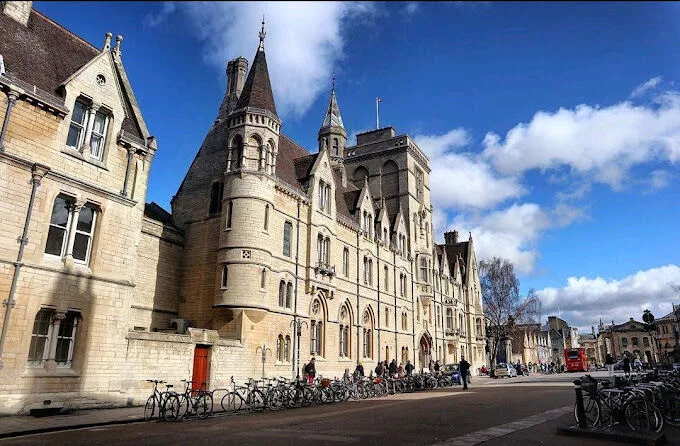
At the heart of academic excellence and tradition, the University of Oxford stands as a paragon among the best universities in the UK for Masters. Renowned globally for its historic foundations and profound impact on education and society, Oxford offers a myriad of Master’s programs that are both comprehensive and cutting-edge. The university prides itself on a distinctive course structure that meticulously blends rigorous academic instruction with pioneering research, designed to challenge and inspire the next generation of leaders. Oxford’s unique features and strengths lie in its collegiate system, which fosters a close-knit community and allows for personalized learning and mentorship. Each college within the university serves as a microcosm of Oxford’s diverse and dynamic academic community, offering students unparalleled support and resources. The duration of Master’s programs typically spans one to two years, offering both full-time and part-time options to accommodate a variety of student needs and aspirations.
Key facilities at Oxford include world-class libraries, such as the Bodleian, modern research laboratories, and dedicated centers for advanced studies across disciplines. These resources, coupled with the university’s rich academic workshops and seminars, provide students with the tools necessary to pursue groundbreaking research and scholarship. Notable alumni who have walked the halls of Oxford include leaders in politics, literature, science, and the arts, illustrating the university’s profound influence in shaping global thought and innovation. The admission process at Oxford is highly competitive, seeking candidates who demonstrate not only academic excellence but also a deep commitment to their field of study. Prospective students are required to submit a detailed application, including academic transcripts, references, and a personal statement, followed by subject-specific tests and interviews for certain programs. Embarking on a Master’s journey at Oxford means becoming part of a legacy of intellectual rigor, innovation, and achievement that continues to make significant contributions to the world.
Overview of the Program:
The University of Cambridge offers a wide range of Master’s programs across various disciplines, renowned for their rigorous academic standards and emphasis on research excellence. Each program is designed to challenge students intellectually while providing opportunities for personal and professional growth.
Unique Features and Strengths:
- Historic Prestige: Established in 1209, Cambridge is one of the oldest and most prestigious universities in the world.
- Innovative Research: Cambridge is a leader in cutting-edge research, with numerous research centers and institutes.
- Global Network: Strong international partnerships and a diverse student body.
- Strengths: Exceptional teaching quality, top-tier research output, high employability.
- Weaknesses: Slightly lower student satisfaction due to high pressure.
Course Structure and Duration:
- Duration: Most Master’s programs at Cambridge are one-year full-time courses.
- Structure: Programs typically include a mix of lectures, seminars, workshops, and independent research, culminating in a dissertation.
Key Facilities and Resources:
- Libraries: Access to over 100 libraries, including the famous Cambridge University Library.
- Laboratories: State-of-the-art labs and research facilities across various departments.
- Support Services: Comprehensive student support services, including career advice, mental health services, and academic support.
Notable Alumni and Achievements:
- Alumni: Cambridge has produced 121 Nobel Laureates, 47 world leaders, and 210 Olympic medalists.
- Achievements: Renowned for contributions to fields such as science, literature, politics, and economics.
Admission Process and Requirements:
- Application: Prospective students need to apply via the university’s online portal.
- Requirements: Typically require a first-class or high upper-second-class undergraduate degree, strong references, and a well-articulated statement of purpose. Specific requirements may vary by program.
- Deadlines: Deadlines vary by program but generally fall between December and March for the following academic year.
Metrics Evaluation
- Quality of Teaching: 5/5
Cambridge boasts exceptional teaching standards, with many programs led by world-renowned academics. The university’s emphasis on small group teaching (supervisions) ensures personalized and in-depth learning experiences. - Research Output and Impact: 5/5
Cambridge is a global leader in research, consistently producing high-impact research across disciplines. The university’s research output is supported by extensive funding and cutting-edge facilities. - Student Satisfaction: 4.5/5
Student satisfaction at Cambridge is high, with students particularly appreciating the supportive academic environment and the vibrant collegiate system. The demanding nature of the programs can be challenging, but the support systems in place help mitigate stress. - Graduate Employability: 5/5
Cambridge graduates are highly sought after by employers worldwide. The university’s strong reputation, extensive alumni network, and career services contribute to excellent employment outcomes for graduates.
Overall Rating: 5/5
The University of Cambridge offers an unparalleled Master’s education experience, combining historic prestige, cutting-edge research, exceptional teaching, and strong employability prospects. It is an ideal choice for students looking to pursue advanced studies in a rigorous and supportive academic environment.
Read more on the courses and programs offered in Oxford for masters
University of Cambridge
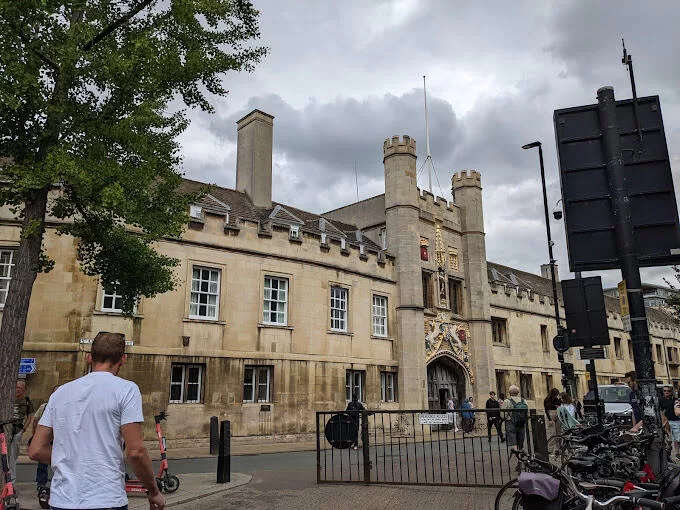
The University of Cambridge, a beacon of scholarly tradition and innovation, is synonymous with academic prestige and groundbreaking research. Its rich history is matched by its commitment to fostering a vibrant community of thinkers, leaders, and innovators. Cambridge’s Master’s programs are known for their rigorous standards, designed to challenge and expand the intellectual horizons of students. With a strong focus on individual development, the university encourages students to engage deeply with their chosen fields, supported by a distinguished faculty known for their contributions to knowledge and society. The collegiate system at Cambridge offers a unique, supportive environment, encouraging collaboration and fostering a sense of belonging among students. Specialized libraries, state-of-the-art laboratories, and extensive research resources empower students to pursue their academic inquiries to the fullest. The opportunity to be part of this storied institution is not just an educational journey but a transformative experience, cultivating skills, and insights that resonate well beyond the realms of academia.
Overview of the Program:
The University of Oxford is renowned for its rigorous academic environment and centuries-old traditions. It offers a wide range of master’s programs across various disciplines, providing a deep dive into academic excellence and intellectual inquiry.
Unique Features and Strengths:
- Prestigious reputation as one of the oldest and most respected universities globally.
- Oxford’s tutorial system fosters personalized learning and critical thinking.
- Extensive libraries and research facilities support scholarly pursuits.
- Strengths: World-renowned faculty, significant research contributions, excellent career prospects.
- Weaknesses: Similar to Cambridge, high academic pressure affects student satisfaction.
Course Structure and Duration:
Master’s programs typically last one to two years, depending on the field of study and specific program requirements. Courses are designed to integrate theoretical knowledge with practical application, ensuring a comprehensive learning experience.
Key Facilities and Resources:
- Bodleian Libraries, one of the oldest and largest library systems globally.
- State-of-the-art laboratories and research centers across various disciplines.
- Access to a vibrant academic community and interdisciplinary research opportunities.
Notable Alumni and Achievements:
- Alumni include numerous Nobel laureates, heads of state, and influential figures in various fields.
- Pioneering contributions to scientific research, literature, and social sciences.
Admission Process and Requirements:
- Applicants must demonstrate academic excellence, often requiring a minimum of a bachelor’s degree with high grades.
- Submission of a detailed application, including academic transcripts, letters of recommendation, and a personal statement.
- Specific program requirements may include standardized test scores (e.g., GRE, GMAT) and interviews.
Metrics Evaluation
- Quality of Teaching: 5/5
Oxford’s tutorial system and renowned faculty ensure exceptional teaching quality, fostering deep engagement and critical thinking. - Research Output and Impact: 5/5
The university consistently produces groundbreaking research with significant global impact, contributing to its stellar academic reputation. - Student Satisfaction: 4/5
Students appreciate the challenging yet enriching academic environment, though the rigorous workload may be demanding. - Graduate Employability: 5/5
Oxford graduates are highly sought after by employers worldwide, thanks to their rigorous training, critical thinking skills, and prestigious credentials.
Overall Rating: 4.75/5
The University of Oxford excels across all evaluated metrics, offering unparalleled academic rigor, extensive research opportunities, and exceptional graduate outcomes, making it a top choice for ambitious scholars worldwide.
Read more on the courses and programs offered in Cambridge for masters
Imperial College London
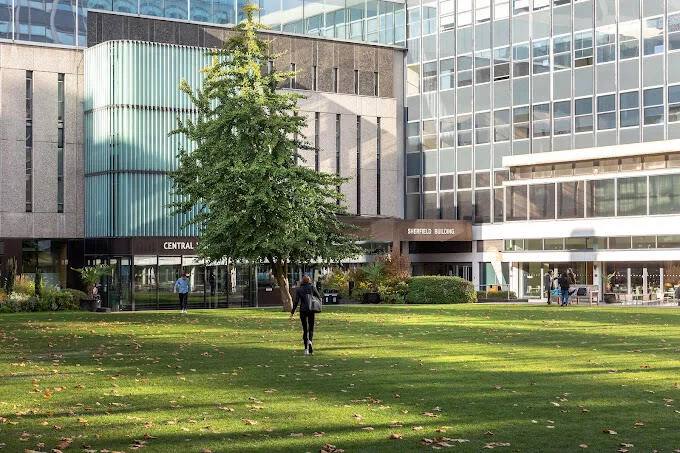
Imperial College London is a powerhouse of innovation and expertise, particularly celebrated for its leadership in engineering, science, and medicine. This institution is a dream destination for students who are eager to immerse themselves in research-intensive Master’s programs and work alongside some of the most brilliant minds in their fields. The environment at Imperial is one that buzzes with creativity and relentless pursuit of knowledge, offering a curriculum that is both challenging and deeply rewarding. Students here gain not just an education but a unique opportunity to be at the forefront of cutting-edge research that has the potential to change the world. With a vibrant campus located in the heart of London, Imperial also offers the added advantage of being at the crossroads of cultural and professional networks, enhancing both the personal and academic aspects of the student experience. This dynamic backdrop, coupled with Imperial’s commitment to fostering a diverse and inclusive student body, makes it a place where future innovators, leaders, and thinkers converge to push the boundaries of what’s possible.
Overview of the Program:
Imperial College London offers a wide range of master’s programs across various disciplines, emphasizing cutting-edge research and practical application.
Unique Features and Strengths:
- Research Excellence: Internationally recognized for its groundbreaking research in STEM fields.
- Industry Partnerships: Strong ties with industry leaders facilitate real-world learning and career opportunities.
- Global Impact: Contributions to global challenges through innovation and entrepreneurship.
- Strengths: Specialization in STEM fields, innovative research, strong industry links.
- Weaknesses: High cost of living in London, moderate student satisfaction.
Course Structure and Duration:
Master’s programs typically range from one to two years, depending on the field of study. Courses are designed to combine theoretical knowledge with practical skills.
Key Facilities and Resources:
- Laboratories and Workshops: State-of-the-art facilities equipped for advanced research.
- Libraries and Archives: Extensive resources supporting academic studies and research.
- Career Services: Dedicated support for internships, placements, and job placements.
Notable Alumni and Achievements:
- Alumni Impact: Alumni include Nobel laureates, CEOs, and influential leaders across various sectors.
- Innovative Achievements: Pioneering discoveries and inventions that have shaped scientific and technological advancements globally.
Admission Process and Requirements:
Prospective students must typically meet stringent academic requirements, including undergraduate degree transcripts, letters of recommendation, and in some cases, standardized test scores like the GRE or GMAT.
Metrics Evaluation:
- Quality of Teaching: 5/5
Imperial College London excels in providing high-quality teaching with a focus on research-led learning and industry relevance. - Research Output and Impact: 5/5
The university is at the forefront of global research, contributing significantly to scientific and technological advancements. - Student Satisfaction: 4/5
Generally high satisfaction among students, supported by comprehensive facilities, resources, and career services. - Graduate Employability: 5/5
Imperial College London graduates are highly sought after by employers globally, given their strong academic foundation and practical skills.
Overall Rating: 5/5
Imperial College London stands out as a top choice for master’s studies, offering exceptional education, research opportunities, and career prospects globally.
Read more on the courses and programs offered
University College London (UCL)
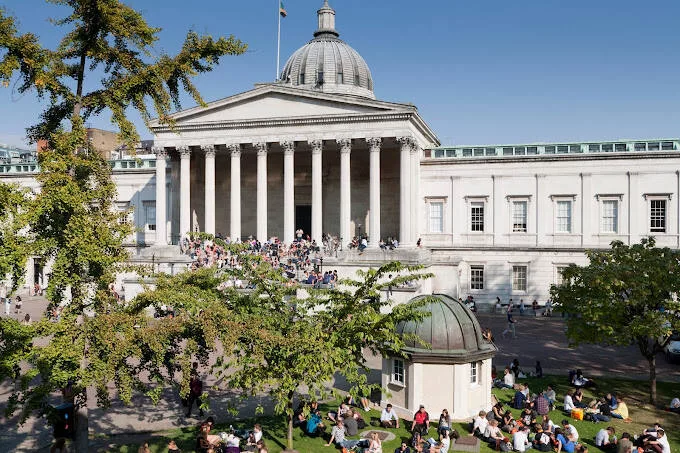
University College London (UCL) is a vibrant nucleus of culture, innovation, and academic prowess, making it an outstanding choice for students pursuing a Masters. UCL is celebrated for its interdisciplinary approach, merging traditional disciplines with cutting-edge research to address some of the world’s most pressing challenges. This institution is at the forefront of fostering a diverse and inclusive academic environment, where students from around the globe come together to share ideas, perspectives, and cultures. With a commitment to excellence in teaching and research, UCL provides a wide array of Masters programs across the sciences, arts, and humanities, ensuring students can find a path that aligns with their passions and career aspirations. The university’s central London location offers unparalleled access to cultural landmarks, professional networks, and opportunities for industry engagement, enriching the student experience beyond the classroom. At UCL, the journey toward a Masters degree is about more than academic growth—it’s about becoming part of a community that values creativity, innovation, and making a global impact.
Overview of the Program:
University College London (UCL) offers a diverse range of Master’s programs across various disciplines including science, engineering, social sciences, humanities, and more. Known for its rigorous academic standards and innovative teaching methods, UCL provides a dynamic and supportive environment for postgraduate students.
Unique Features and Strengths:
- Interdisciplinary Approach: UCL encourages interdisciplinary studies, allowing students to tailor their programs to suit their academic and career goals.
- Global Research Impact: The university boasts a strong international research network, making it a leader in cutting-edge research and innovation.
- Diverse Community: UCL is one of the most cosmopolitan universities in the world, with students and faculty from over 150 countries.
- Central London Location: Situated in the heart of London, UCL offers unparalleled access to cultural, professional, and academic resources.
- Strengths: Excellent research network, diverse student body, good employability.
- Weaknesses: Cost of living, competitive environment.
Course Structure and Duration:
Most Master’s programs at UCL are one year full-time or two years part-time. The course structure typically includes a combination of lectures, seminars, practical workshops, and independent research projects.
Key Facilities and Resources:
- State-of-the-art Laboratories: Equipped with the latest technology to support advanced research and learning.
- Extensive Libraries: Access to one of the largest academic libraries in the UK, along with numerous digital resources.
- Innovation and Enterprise Hub: Supports students in developing entrepreneurial skills and bringing innovative ideas to market.
- Student Support Services: Comprehensive services including career advice, mental health support, and academic assistance.
Notable Alumni and Achievements:
- Notable Alumni: Mahatma Gandhi, Alexander Graham Bell, and Chris Martin of Coldplay are among UCL’s distinguished alumni.
- Achievements: UCL researchers have made significant contributions in various fields, including the discovery of the structure of DNA and advancements in artificial intelligence.
Admission Process and Requirements:
- Application: Prospective students must submit an online application through the UCL admissions portal.
- Requirements: A relevant undergraduate degree with a strong academic record, letters of recommendation, a personal statement, and, in some cases, standardized test scores (e.g., GRE, GMAT).
- English Proficiency: Non-native English speakers need to provide proof of English proficiency through tests such as IELTS or TOEFL.
Metrics and Ratings:
-
Quality of Teaching: 4.5/5
UCL is renowned for its high-quality teaching, with experienced faculty who are leaders in their respective fields. The university’s emphasis on interactive learning and student engagement ensures a rich educational experience. -
Research Output and Impact: 5/5
UCL has a stellar reputation for research output and impact, consistently ranking among the top institutions globally. The university’s research spans a wide range of disciplines, contributing significantly to advancements in science, technology, and the humanities. -
Student Satisfaction: 4/5
Students at UCL report high levels of satisfaction, particularly appreciating the supportive academic environment, diverse community, and access to extensive resources. However, the fast-paced nature of the programs can be demanding. -
Graduate Employability: 4.5/5
UCL graduates are highly sought after by employers worldwide. The university’s strong industry connections and emphasis on practical skills ensure that graduates are well-prepared for their careers.
Overall Rating: 4.5/5
University College London (UCL) offers an outstanding Master’s program experience with its exceptional teaching quality, groundbreaking research, and strong graduate employability. The university’s unique features, such as its interdisciplinary approach and central London location, make it an excellent choice for prospective students looking to further their education in a vibrant, globally connected environment.
Read more on the courses and programs offered in ucl for masters
The University of Edinburgh

The University of Edinburgh, nestled in the heart of Scotland’s historic capital, is a beacon of innovation and academic excellence. Renowned for its vibrant research community and diverse range of Master’s programs, Edinburgh offers a rich educational tapestry woven with tradition and forward-thinking. The university is particularly celebrated for its contributions to the humanities, medical sciences, and engineering, providing students with a robust platform for scholarly and professional development. Beyond the walls of academia, Edinburgh’s scenic beauty and cultural heritage enhance the student experience, offering a unique blend of intellectual stimulation and personal enrichment. The collaborative environment at Edinburgh encourages students to cross traditional academic boundaries, fostering interdisciplinary research and a global perspective on pressing issues. This nurturing of broad-mindedness, coupled with the university’s strong ties to industries and professional networks, ensures that graduates are well-equipped to navigate the complexities of the modern world. Engaging with the University of Edinburgh means embarking on a journey of discovery, where learning transcends the classroom, and students are prepared to make meaningful contributions to society.
Overview of the Program:
The University of Edinburgh, located in Scotland’s vibrant capital, is renowned for its diverse and high-quality Masters programs. Established in 1582, it combines rich history with cutting-edge research and modern facilities, making it a top choice for students worldwide.
Unique Features and Strengths:
- Interdisciplinary Approach: Offers a broad range of programs that encourage interdisciplinary study.
- Global Reputation: Known for its research excellence and global partnerships.
- Sustainability Focus: Committed to becoming carbon neutral by 2040.
- Cultural Richness: Located in a UNESCO World Heritage city with numerous cultural festivals and historical sites.
- Strengths: Strong research output, sustainability initiatives, diverse community.
- Weaknesses: Variable teaching quality across departments.
Course Structure and Duration:
- Duration: Typically 1 year for full-time Masters programs.
- Structure: Courses often include a combination of lectures, seminars, practical sessions, and a dissertation or research project.
- Flexibility: Options for part-time study and various entry points throughout the year.
Key Facilities and Resources:
- Libraries: Extensive library system with millions of resources, including the Main Library and specialized collections.
- Research Centers: State-of-the-art facilities such as the Edinburgh Cancer Research Centre and the Roslin Institute.
- Technology: Cutting-edge IT infrastructure and online learning platforms.
Notable Alumni and Achievements:
- Alumni: Includes pioneers like Charles Darwin, Sir Arthur Conan Doyle, and Alexander Graham Bell.
- Achievements: Numerous Nobel laureates and significant contributions to fields like medicine, science, and literature.
Admission Process and Requirements:
- Entry Requirements: Generally, a relevant undergraduate degree with a strong academic record. Specific requirements vary by program.
- Application: Online application through the university portal, including submission of transcripts, references, and a personal statement.
- Deadlines: Vary by program, with rolling admissions in some cases.
Metrics and Ratings:
- Quality of Teaching: 4.5/5
Highly qualified faculty, innovative teaching methods, and a strong emphasis on student engagement and support. - Research Output and Impact: 5/5
Ranked among the top universities globally for research impact, with significant contributions to various fields and extensive international collaborations. - Student Satisfaction: 4/5
Generally high levels of student satisfaction, with positive feedback on academic support, campus facilities, and the overall student experience. - Graduate Employability: 4.5/5
Strong employability outcomes, with graduates highly sought after by employers worldwide, supported by robust career services and industry links.
Overall Rating: 4.5/5
The University of Edinburgh offers a compelling combination of academic excellence, research prowess, and a vibrant student life, making it an excellent choice for prospective Masters students aiming for a top-tier education and promising career prospects.
Read more on the courses and programs offered in Edinburgh for masters
The University of Manchester
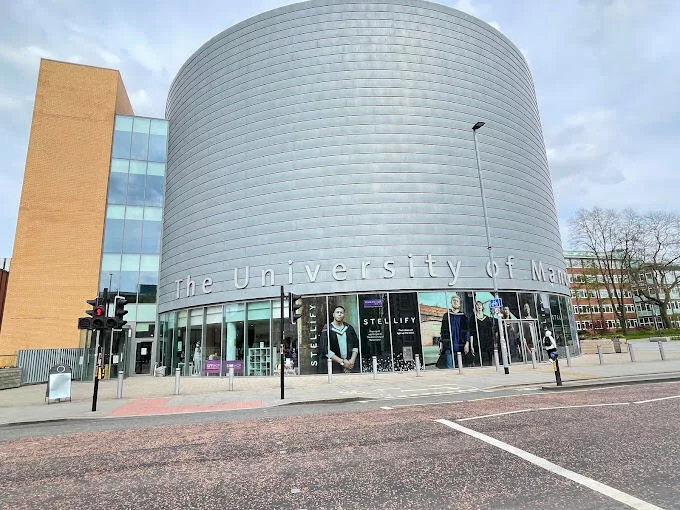
The University of Manchester is a bastion of innovation, diversity, and academic rigor, making it a standout choice for students eyeing a Master’s degree. This university is renowned for its strong emphasis on research-led teaching, ensuring that students are at the cutting edge of their field. With an impressive array of Master’s programs spanning the sciences, humanities, and social sciences, Manchester provides a fertile ground for intellectual growth and discovery. The campus life at Manchester is as enriching as its academic programs, characterized by a vast array of student societies, sports teams, and cultural activities, all set within one of the UK’s most vibrant cities. Manchester’s dedication to fostering a supportive and inclusive environment is evident in its global community of students and staff, making it an ideal setting for those looking to study in a dynamic and interconnected academic atmosphere. Here, students are encouraged to challenge conventions and think critically, equipping them with the skills needed to excel in their future careers and make a positive impact in their communities.
Overview of the Program:
The University of Manchester offers a diverse range of Masters programs across various disciplines, renowned for their academic excellence and industry relevance. With a strong emphasis on research and practical application, students are prepared to excel in their chosen fields.
Unique Features and Strengths:
- England’s first civic university with a deep connection to the city’s industrial heritage.
- Strong focus on employability and transferable skills.
- Manchester Leadership Programme combining volunteer work with academic studies.
- Extensive support services including career counselling, CV workshops, internships, and mentorship programs.\
- Strengths: High employability, good support services, civic engagement.
- Weaknesses: Inconsistent teaching quality, large student body.
Course Structure and Duration:
Masters programs typically span one year for full-time students, with part-time options available. Courses are designed to blend theoretical knowledge with practical skills, often including a research project or dissertation.
Key Facilities and Resources:
- State-of-the-art research labs and libraries.
- Career Services Centre offering extensive support.
- Modern student accommodation and recreational facilities.
- Access to a vibrant city with rich cultural and industrial opportunities.
Notable Alumni and Achievements:
- 25 Nobel Prize winners associated with the university.
- Graduates holding key positions in industry, academia, and government.
- Pioneering research in various fields including graphene, cancer research, and data science.
Admission Process and Requirements:
- A bachelor’s degree with a strong academic record.
- English language proficiency (IELTS/TOEFL scores).
- Specific course requirements and prerequisites.
- Submission of a personal statement and letters of recommendation.
Metrics and Ratings:
- Quality of Teaching: 4.5/5
The University of Manchester is renowned for its high-quality teaching, with experienced faculty and innovative teaching methods that engage and challenge students. - Research Output and Impact: 5/5
The university excels in research, consistently ranked among the top for research power in the UK. It has a significant impact on global research initiatives, particularly in science and engineering. - Student Satisfaction: 4/5
Students generally report high levels of satisfaction with their courses, facilities, and overall university experience. Support services and student life activities contribute positively to their satisfaction. - Graduate Employability: 4.5/5
Manchester graduates are highly sought after by employers. The university’s strong industry connections and focus on employability skills ensure that students are well-prepared for their careers.
Overall Rating: 4.5/5
The University of Manchester offers an excellent environment for Masters students, with top-tier teaching, impactful research, and strong graduate employability. Its dynamic campus and comprehensive support services further enhance the student experience.
Additional Details:
- The university’s strategic location in Manchester provides students with access to numerous cultural, social, and professional opportunities.
- The Manchester Leadership Programme and other initiatives foster personal development and community engagement.
- The university’s commitment to sustainability and social responsibility is evident in its operations and curriculum.
Read more on the courses and programs offered in Manchester for masters
King’s College London (KCL)
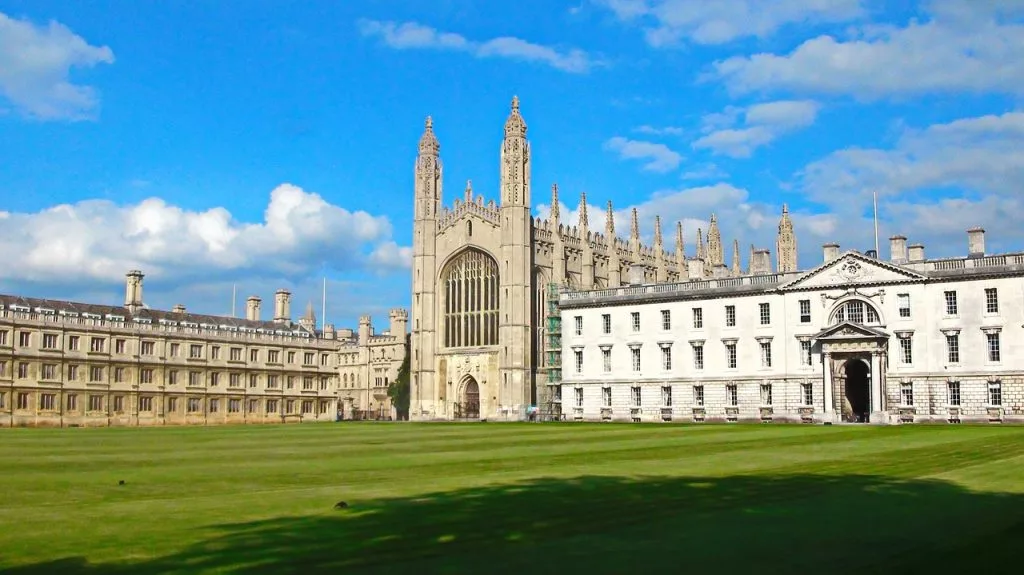
King’s College London (KCL) distinguishes itself as a hub for innovative thinking and global influence, firmly placing it among the UK’s premier institutions for pursuing a Master’s degree. Renowned for its comprehensive range of programs in the humanities, law, sciences, and health sciences, KCL offers students an immersive academic environment that bridges traditional scholarship with contemporary research challenges. The university is deeply committed to advancing societal change through its pioneering research and has a notable reputation for its impact on public policy, healthcare, and the arts. Students at KCL benefit from its central London location, which provides abundant opportunities for professional networking, cultural immersion, and access to world-leading libraries, museums, and academic resources. The diverse and inclusive community at KCL encourages a collaborative and supportive learning experience, where students from around the globe engage with cutting-edge debates and ideas. KCL’s emphasis on interdisciplinary study ensures that graduates are well-prepared to navigate and contribute to an increasingly complex world, making it an ideal place for those who are eager to make a significant impact in their fields of study.
Overview of the Program
King’s College London (KCL) offers a diverse range of Master’s programs across various disciplines, including the humanities, social sciences, law, health sciences, and engineering. Renowned for its rigorous academic standards, KCL aims to equip students with the skills and knowledge needed to excel in their chosen fields.
Unique Features and Strengths
- Historical Prestige: Founded in 1829, KCL is one of the oldest and most prestigious universities in the UK.
- Strategic Location: Located in the heart of London, offering students access to world-class cultural, professional, and research opportunities.
- Interdisciplinary Approach: Promotes interdisciplinary study and research, encouraging collaboration across different fields.
- Strengths: Strong research network, international reputation, central London location.
- Weaknesses: High cost of living, moderate student satisfaction.
Course Structure and Duration
Master’s programs at KCL typically last one year for full-time students and two years for part-time students. The course structure includes a mix of core modules, electives, and a research dissertation or project. Some programs may also offer internships or placement opportunities.
Key Facilities and Resources
- Libraries: Extensive library resources, including the Maughan Library, one of the largest new university libraries in the UK.
- Research Centers: Numerous research centers and institutes, such as the Florence Nightingale Faculty of Nursing, Midwifery & Palliative Care.
- Technological Resources: State-of-the-art laboratories, computer facilities, and access to cutting-edge research tools.
Notable Alumni and Achievements
- Notable Alumni: Desmond Tutu (Nobel Peace Prize Laureate), Thomas Hardy (novelist and poet), and Rosalind Franklin (contributed to the discovery of DNA structure).
- Achievements: KCL has a strong track record of research excellence and innovation, contributing to significant scientific, medical, and social advancements.
Admission Process and Requirements
- Admission Requirements: Typically requires a bachelor’s degree with a minimum grade equivalent to a UK upper second-class honors. Specific requirements may vary by program.
- Application Process: Online application through the KCL admissions portal, including submission of academic transcripts, a personal statement, and letters of recommendation. Some programs may require a portfolio or an interview.
Metrics and Ratings
- Quality of Teaching: 4.5/5
KCL is renowned for its high-quality teaching, with a strong emphasis on research-led education. The university employs experienced and distinguished faculty members who are leaders in their respective fields. Innovative teaching methods and small class sizes enhance the learning experience. - Research Output and Impact: 5/5
KCL boasts a prolific research output with a global impact. The university is involved in groundbreaking research across various disciplines, supported by substantial funding and international collaborations. Its research excellence is reflected in numerous publications, citations, and contributions to significant societal advancements. - Student Satisfaction: 4/5
Student satisfaction at KCL is generally high, with students appreciating the supportive academic environment, extensive resources, and vibrant campus life. Feedback highlights the university’s commitment to student welfare and the availability of extracurricular activities and support services. - Graduate Employability: 4.5/5
Graduates from KCL are highly sought after by employers worldwide. The university’s strong industry connections, career services, and focus on employability skills ensure that students are well-prepared for the job market. KCL ranks highly for graduate employment rates and employer reputation.
Overall Rating: 4.5/5
King’s College London is a top choice for prospective Master’s students seeking a prestigious education, extensive research opportunities, and excellent career prospects. Its strategic location in London, combined with its rich history and commitment to academic excellence, makes it an ideal destination for higher education.
Read more on the courses and programs offered in kcl for masters
The London School of Economics and Political Science (LSE)
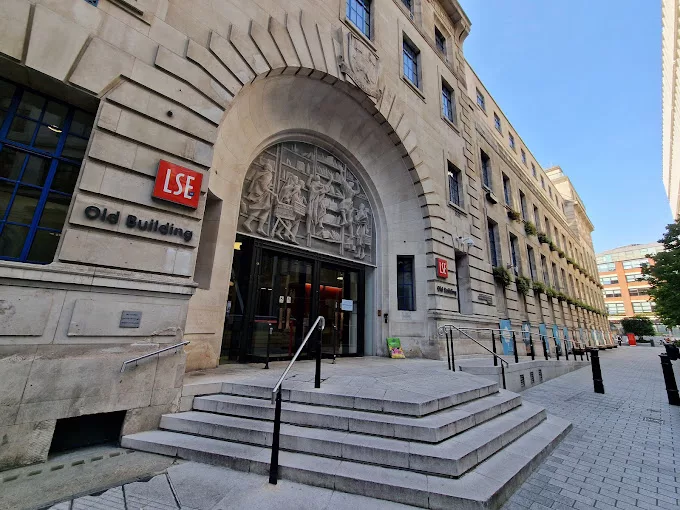
The London School of Economics and Political Science (LSE) is a globally recognized institution, standing out for its concentrated focus on the social sciences. Renowned for shaping critical thinkers and leaders, LSE offers a rigorous and intellectually stimulating environment for those pursuing a Master’s degree. Its curriculum is deeply infused with a global perspective, addressing the complexities of today’s interdependent world. At LSE, students find themselves in a dynamic and engaging academic community where innovation in economics, politics, sociology, law, and a range of interdisciplinary subjects is at the forefront. The institution boasts a vibrant student body from over 160 countries, providing a rich tapestry of cultural and intellectual diversity. This diversity, combined with the school’s central London location, offers unparalleled opportunities for networking, internships, and access to leading organizations and institutions. LSE’s commitment to applying theory to real-world issues means that students are not just prepared for academic excellence but are also equipped to make substantial contributions to society and their respective fields. Engaging with LSE means being at the heart of debate, analysis, and research that influences global policy and decision-making.
Overview of the Program:
LSE offers a diverse range of Master’s programs across various disciplines, including economics, political science, law, sociology, and more. These programs are designed to equip students with advanced knowledge and skills necessary for successful careers in academia, industry, and public service.
Unique Features and Strengths:
- LSE is renowned for its interdisciplinary approach and emphasis on social sciences.
- Strong focus on research, policy analysis, and global economic issues.
- Highly international student body and faculty, fostering a global perspective.
- Strengths: Specialized social sciences focus, diverse student body, excellent employability.
- Weaknesses: High cost of living, less emphasis on student support.
Course Structure and Duration:
- Most Master’s programs are one year in duration for full-time students, with part-time options available.
- Programs typically include a combination of core courses, electives, and a dissertation or research project.
Key Facilities and Resources:
- Extensive library and research facilities, including the British Library of Political and Economic Science.
- Access to various research centers and institutes specializing in social sciences.
- Modern classrooms, IT services, and student support centers.
Notable Alumni and Achievements:
- LSE has produced numerous influential leaders, including 18 Nobel Prize winners and multiple world leaders.
- Alumni include renowned economists, politicians, and academics such as George Soros, Ursula von der Leyen, and David Attenborough.
Admission Process and Requirements:
- Competitive admission process requiring a strong academic background.
- Applicants typically need a first or upper second class honors degree (or equivalent).
- English language proficiency tests (e.g., IELTS, TOEFL) are required for non-native speakers.
- Personal statement, letters of recommendation, and relevant work experience are often part of the application process.
Metrics Evaluation
- Quality of Teaching: 5/5
LSE is known for its rigorous academic standards and expert faculty, many of whom are leaders in their fields. Emphasis on critical thinking, analytical skills, and practical application of knowledge. - Research Output and Impact: 5/5
LSE’s research output is substantial, with significant contributions to policy and academic debates worldwide. Home to various research centers that influence global economic and social policies. - Student Satisfaction: 4/5
High levels of student satisfaction, particularly regarding academic support and campus facilities. Strong student community with numerous societies, events, and activities. - Graduate Employability: 5/5
Graduates from LSE are highly sought after by employers globally, particularly in sectors such as finance, government, and academia. Extensive career services, including internships, job placements, and networking opportunities.
Overall Rating: 4.75/5
LSE offers a top-tier education with a strong global reputation, excellent research facilities, and high employability rates. It is an ideal choice for students seeking a comprehensive and impactful Master’s program in the social sciences.
Read more on the courses and programs offered in lse for masters
The University of Warwick

The University of Warwick is celebrated for its innovative approach to higher education, blending rigorous academic study with creative problem-solving. This institution is particularly renowned for its outstanding business school, engineering departments, and strong emphasis on interdisciplinary research, making it a prime destination for Master’s students looking to push the boundaries of conventional learning. Warwick’s campus, situated in the heart of England, provides a bustling community where students from a myriad of backgrounds come together, fostering a rich cultural exchange and collaborative learning atmosphere. The university’s commitment to research excellence and teaching quality ensures that students are engaged with the latest developments in their field, guided by leading academics and industry experts. Additionally, Warwick’s strategic partnerships with global institutions and businesses open up vast opportunities for students to gain practical experience and international exposure. For those seeking a Master’s degree in an environment that champions innovation, diversity, and academic distinction, the University of Warwick offers a dynamic and supportive framework to pursue your ambitions.
Overview of the Program
The University of Warwick, established in 1965, has quickly become one of the UK’s leading institutions, known for its academic excellence and innovative research. It offers a wide range of Masters programs across various disciplines, including science, engineering, social sciences, business, and the arts.
Unique Features and Strengths
- Global Outlook: Warwick boasts a diverse student body with 42.9% of students and staff from overseas.
- International Partnerships: The university has over 200 partner institutions worldwide, offering ample study abroad opportunities.
- Research Excellence: Known for its international research network, Warwick scores highly for collaborative and impactful research.
- Strengths: International faculty and student ratios, strong global outlook, study abroad opportunities.
- Weaknesses: Younger university, relatively less historical prestige.
Course Structure and Duration
Masters programs at Warwick typically last one year for full-time students and two years for part-time students. The course structure includes a combination of lectures, seminars, workshops, and independent research. Many programs also offer practical placements or internships.
Key Facilities and Resources
- Modern Campus: The campus features state-of-the-art facilities, including the Warwick Arts Centre, one of the largest cultural venues in the UK.
- Research Centers: Warwick is home to several renowned research centers and institutes, providing resources and support for cutting-edge research.
- Library and Study Spaces: The university library offers extensive resources, study spaces, and 24/7 access during term time.
Notable Alumni and Achievements
- Notable Alumni: Warwick has produced numerous successful graduates, including politicians, business leaders, and academics.
- Achievements: The university is known for its entrepreneurial spirit and has a strong track record in graduate startups and innovations.
Admission Process and Requirements
- Requirements: A good undergraduate degree (UK 2:1 or equivalent) in a relevant field. Some programs may have specific prerequisites or require work experience.
- Application: Prospective students need to submit an online application, including academic transcripts, a personal statement, and letters of recommendation. International students may also need to provide proof of English language proficiency.
Metrics Evaluation
- Quality of Teaching: 4.5/5
Warwick is known for its high-quality teaching, with a focus on innovative and interactive learning methods. Faculty members are experts in their fields, often involved in significant research. - Research Output and Impact: 4.5/5
The university’s research output is substantial, with impactful contributions in various disciplines. It ranks highly for its international research network. - Student Satisfaction: 4/5
Warwick consistently receives high marks for student satisfaction, with students praising the supportive environment and the quality of education. - Graduate Employability: 4.5/5
Warwick graduates are highly sought after by employers, thanks to the university’s strong industry connections and emphasis on employability skills. The university ranks 17th in the UK for its international research network.
Overall Rating: 4.5/5
The University of Warwick offers a dynamic and enriching environment for Masters students, with strong academic programs, excellent research facilities, and a commitment to student success. Its global outlook and high employability rates make it an attractive choice for prospective students aiming to advance their careers and make significant contributions to their fields.
Read more on the courses and programs offered in Warwick for masters
The University of Bristol

The University of Bristol shines as a beacon of intellectual vibrancy and pioneering research within the UK’s academic landscape. Renowned for its forward-thinking approach and dedication to academic excellence, Bristol offers a wide array of Master’s programs that cater to the diverse interests and aspirations of its students. Situated in a city known for its innovation and cultural dynamism, the university leverages its location to enhance the educational experience, connecting students with industry leaders and groundbreaking projects right at their doorstep. Bristol’s commitment to creating a supportive and stimulating environment is evident in its state-of-the-art facilities, robust support services, and active student community. The university’s emphasis on interdisciplinary collaboration encourages students to venture beyond traditional boundaries, fostering a culture of curiosity and continuous learning. With a strong focus on employability, Bristol prepares its graduates to excel in their chosen fields, equipping them with the skills necessary to navigate the complexities of the modern professional landscape. For those drawn to academic rigor combined with practical application, the University of Bristol offers an enriching pathway to personal and professional development.
Overview of the Program:
The University of Bristol offers a wide range of Masters programs across various disciplines, known for their academic rigor and innovative approach. Each program is designed to provide a comprehensive education that combines theoretical knowledge with practical skills.
Unique Features and Strengths:
- Bristol Futures Initiative: Encourages personal development planning and creating a portfolio that enhances career progression.
- Interdisciplinary Research: Strong emphasis on interdisciplinary research with opportunities for students to engage in cutting-edge projects.
- Historic Reputation: One of the first UK universities to admit male and female students on an equal basis, emphasizing inclusivity and equality.
- Strengths: Strong employer reputation, innovative teaching methods, inclusive environment.
- Weaknesses: Moderate cost of living, competitive admission process
Course Structure and Duration:
- Duration: Typically 1 year for full-time programs; part-time options may vary.
- Structure: Combines lectures, seminars, practical sessions, and independent research. Many programs include a dissertation or research project component.
Key Facilities and Resources:
- Libraries and Learning Resources: Extensive library system with access to numerous online journals, databases, and study spaces.
- Research Centers: State-of-the-art research facilities and laboratories.
- Student Support Services: Comprehensive support including career services, counseling, and academic advising.
Notable Alumni and Achievements:
- Alumni include Nobel laureates, influential politicians, and leaders in various industries.
- Recognized for contributions to research and innovation, particularly in the fields of science, engineering, and social sciences.
Admission Process and Requirements:
- Requirements: Typically, a good honors degree (or equivalent) in a relevant subject. Some programs may require work experience or additional qualifications.
- Application: Online application process with submission of transcripts, personal statement, and references. Deadlines vary by program.
Metrics Evaluation
- Quality of Teaching: 4.5/5
Highly qualified faculty known for their expertise and dedication to student success. Innovative teaching methods and a focus on critical thinking and problem-solving skills. - Research Output and Impact: 4.5/5
High research output with significant impact in various fields. Strong emphasis on interdisciplinary research and real-world applications. - Student Satisfaction: 4/5
Positive feedback from students regarding teaching quality, campus facilities, and support services. Active student community and numerous extracurricular opportunities. - Graduate Employability: 4.5/5
Strong employer reputation with graduates highly sought after in the job market. Comprehensive career services and initiatives like the Bristol Futures initiative to enhance employability.
Overall Rating: 4.5/5
Additional Details
Student Life:
- Vibrant student life with numerous clubs, societies, and cultural events.
- Located in the dynamic city of Bristol, offering a mix of historic charm and modern amenities.
Financial Considerations:
- Various scholarships and funding opportunities available for international and domestic students.
- Reasonable cost of living in Bristol compared to other major UK cities.
Read more on the courses and programs offered in Bristol for Masters
Conclusion
Making the decision to pursue a Master’s degree at a UK university is pivotal, and thorough research is key to ensuring the best fit for your academic and career aspirations. Each university offers unique strengths—from world-class research to exceptional teaching and strong graduate employability.
By considering metrics such as teaching quality, research impact, student satisfaction, and employability, prospective students can make informed choices that align with their goals. It’s crucial to explore each university’s website for detailed program information, faculty profiles, and admission requirements to ensure a comprehensive understanding before making your decision. Embrace this opportunity to shape your future by choosing the university that best supports your academic journey and career ambitions.
FAQs
-
What are the typical admission requirements for Master’s programs at UK universities?
- Answer: Admission requirements vary but generally include a bachelor’s degree, relevant work experience (if applicable), English language proficiency (usually through tests like IELTS or TOEFL), and specific program prerequisites.
-
How important is research output when choosing a university for a Master’s degree?
- Answer: Research output indicates the university’s academic strength and impact in various fields. It’s crucial for prospective students aiming to engage in cutting-edge research or pursue academic careers after graduation.
-
What support services do UK universities offer to enhance student satisfaction?
- Answer: UK universities provide comprehensive support services including academic advising, career counseling, student societies, mental health services, and cultural integration programs to ensure a positive student experience.
-
What are the career prospects for graduates of Master’s programs at University of Bristol?
- Answer: Graduates from University of Bristol benefit from strong employer recognition and extensive alumni networks, enhancing their employability across various sectors nationally and internationally.
-
How can I determine the overall quality of teaching at UK universities?
- Answer: Quality of teaching can be assessed through student-to-faculty ratios, teaching awards received by faculty, student feedback on teaching evaluations, and the university’s commitment to continuous improvement in teaching methods and resources.




